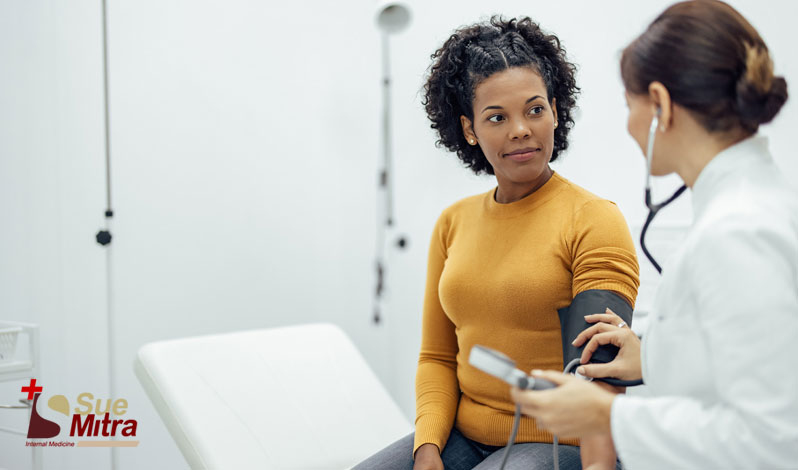
03, Apr 2023
High blood pressure in women can be caused by a variety of factors, including lifestyle habits such as smoking, being overweight, and a lack of exercise. It can also be caused by chronic medical conditions such as diabetes or kidney disease, or be a side effect of certain medications. In some cases, the cause of high blood pressure is unknown. Treatment for high blood pressure in women typically includes lifestyle changes, such as eating a healthy diet, maintaining a healthy weight, exercising regularly, and quitting smoking. In cases where lifestyle changes are not enough to control blood pressure, medications may be prescribed.
1. Swelling in the hands, feet, and ankles: Swelling in the hands, feet, and ankles is a symptom of fluid retention which can be caused by high blood pressure.
2. Severe headaches: Severe headaches are a symptom of high blood pressure, especially if they occur suddenly or are accompanied by dizziness and vision changes.
3. Chest pain: Chest pain, especially when combined with shortness of breath, can be a symptom of high blood pressure.
4. Abnormal menstrual periods: Women with high blood pressure may experience irregular menstrual periods, including heavier than normal bleeding.
5. Fatigue and confusion: High blood pressure may cause extreme fatigue and confusion, especially if it has been left untreated for some time.
6. Difficulty sleeping: Difficulty sleeping, or sleeping more than usual, can be a symptom of high blood pressure.
7. Nausea and vomiting: Nausea and vomiting are two symptoms that are often associated with high blood pressure in women.
8. Blurred vision: Blurred vision can be a symptom of high blood pressure, especially if it is accompanied by headaches and dizziness.
9. Flushing: Flushing or a feeling of warmth in the face or chest can be a sign of high blood pressure.
10. Nosebleeds: Nosebleeds can sometimes be a symptom of high blood pressure.
11. Anxiety and nervousness: High blood pressure can often cause feelings of anxiety and nervousness in women.
12. Palpitations: Palpitations, or a feeling of the heart racing, can be a symptom of high blood pressure.
13. Shortness of breath: Shortness of breath can be a sign of high blood pressure, especially if it is accompanied by chest pain.
14. Increased urination: Increased urination, especially during the night, can be a symptom of high blood pressure.
15. Dizziness: Dizziness can be a sign of high blood pressure, especially if it is accompanied by headaches and blurred vision.
Treatment
High blood pressure is a serious condition and can lead to serious complications. Treatment for high blood pressure usually involves lifestyle changes, such as eating a healthy, balanced diet, exercising regularly, and maintaining a healthy weight. Medication may also be necessary to help lower and control high blood pressure. Other treatments may include reducing stress, quitting smoking, and limiting alcohol consumption. Regular visits to your doctor are important to monitor your blood pressure and adjust your treatment plan as needed.
Conclusion
High blood pressure is a serious condition that can cause a variety of symptoms in women, including swelling in the hands, feet, and ankles; severe headaches; chest pain; abnormal menstrual periods; fatigue and confusion; difficulty sleeping; nausea and vomiting; blurred vision; flushing; nosebleeds; anxiety and nervousness; palpitations; shortness of breath; increased urination; and dizziness. It is important to talk to your doctor if you experience any of these symptoms, as they can indicate a need for treatment.
Dr. Sue Mitra and her staff strive to offer their patients the best care, advice and services available in the medical field with the goal to keep patient healthy & happy.

Dr. Sue Mitra is board certified in international medicine. She is seen here with a Cologuard, which is a noninvasive colon cancer screening test. (Photo by: Tim Shortt/Florida Today)